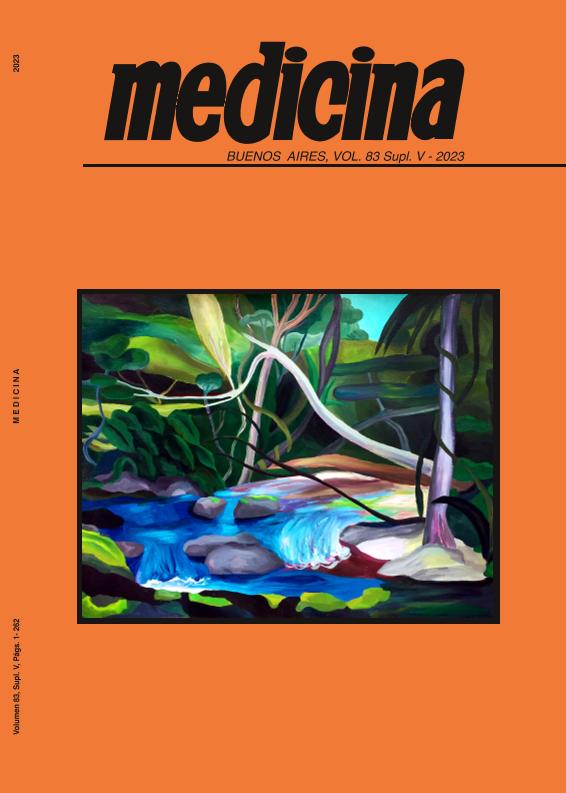Evento
Heme oxygenase-1 impairs hormone- dependent breast cancer cell survival through its enzyme activity
Giorgi, Gisela ; Schweitzer, Karen
; Schweitzer, Karen ; Mascaró, Marilina
; Mascaró, Marilina ; Rebassa, Martin Enrique; Gómez, Florencia Magali; Colo, Georgina Pamela
; Rebassa, Martin Enrique; Gómez, Florencia Magali; Colo, Georgina Pamela ; Fermento, María Eugenia
; Fermento, María Eugenia ; Ferronato, María Julia
; Ferronato, María Julia ; Alonso, Eliana Noelia
; Alonso, Eliana Noelia ; Curino, Alejandro Carlos
; Curino, Alejandro Carlos ; Facchinetti, Maria Marta
; Facchinetti, Maria Marta
 ; Schweitzer, Karen
; Schweitzer, Karen ; Mascaró, Marilina
; Mascaró, Marilina ; Rebassa, Martin Enrique; Gómez, Florencia Magali; Colo, Georgina Pamela
; Rebassa, Martin Enrique; Gómez, Florencia Magali; Colo, Georgina Pamela ; Fermento, María Eugenia
; Fermento, María Eugenia ; Ferronato, María Julia
; Ferronato, María Julia ; Alonso, Eliana Noelia
; Alonso, Eliana Noelia ; Curino, Alejandro Carlos
; Curino, Alejandro Carlos ; Facchinetti, Maria Marta
; Facchinetti, Maria Marta
Tipo del evento:
Reunión
Nombre del evento:
LXVIII Reunión Anual de la Sociedad Argentina de Investigación Clínica; XXV Jornadas Anuales de la Sociedad Argentina de Biología; LV Reunión Anual de la Asociación Argentina de Farmacología Experimental y VIII Reunión Científica Regional de la Asociación Argentina de Ciencia y Tecnología de Animales de Laboratorio
Fecha del evento:
15/11/2023
Institución Organizadora:
Sociedad Argentina de Investigación Clínica;
Sociedad Argentina de Biología;
Asociación Argentina de Farmacología Experimental;
Asociación Argentina de Ciencia y Tecnología de Animales de Laboratorio;
Título de la revista:
Medicina (Buenos Aires)
Editorial:
Fundación Revista Medicina
ISSN:
0025-7680
e-ISSN:
1669-9106
Idioma:
Inglés
Clasificación temática:
Resumen
We have previously reported that induction of Heme Oxygenase-1 (HO-1), an enzyme that catalyzes heme degradation and releases iron, impairs breast cancer (BC) cell survival in both murine hor- mone-independent (LM3) and human triple-negative (MDA-MB-231) BC cell lines, most likely through ferroptosis induction. In this study, we aimed to evaluate the HO-1 modulation on hormone-dependent BC cell survival and to assess the involvement of HO-1 enzyme activity. To this end, we modulated HO-1 in T47D cell line by phar- macological induction (hemin, 36h) and by stable overexpression of wild-type HO1 (WT-HO1) or enzymatically inactive-H25AHO-1 (H25A). We studied cell viability (crystal violet), iron storage (Prus- sian blue), ROS levels (DFCA), lipid peroxidation (MDA accumula- tion) and the expression of ZIP14 iron importer (immunocytochem- istry). We also carried out correlation studies between HO-1 mRNA levels and L-ferritin in BC subtypes (bioinformatics analysis). We found that hemin treatment and WT-HO1 overexpression decreased T47D cell viability (p<0.01 and p<0.05 respectively) and increased iron storage (p<0.05 in both), ROS levels (p<0.01 and p<0.05 re- spectively), MDA accumulation (p<0.01 in both) and ZIP14 expres- sion. The treatment with an antioxidant (N-Acetylcysteine) and an iron chelator (deferoxamine) reversed the reduction of BC cell via- bility induced by hemin and by WT-HO-1 overexpression (p<0.001 and p<0.05 respectively). On the contrary, H25A cell viability was higher and the ROS levels and MDA accumulation were lower than in WT-HO1 cells (p<0.05). Bioinformatics studies confirmed a posi- tive correlation between HO-1 mRNA and L-ferritin in BC subtypes (ER+, ER-, Basal-like, Normal-like, Luminal and HER2 enriched). In conclusion, HO-1 induction impairs cell viability in a hormone-de- pendent BC subtype through an increase in free iron accumulation, ROS production and lipid peroxidation, being the enzymatic activity of HO-1 necessary for its effect on cell viability.
Palabras clave:
HEME OXYGENASE-1
,
BREAST
,
CANCER
,
ENZYME
Archivos asociados
Licencia
Identificadores
Colecciones
Eventos(INIBIBB)
Eventos de INST.DE INVEST.BIOQUIMICAS BAHIA BLANCA (I)
Eventos de INST.DE INVEST.BIOQUIMICAS BAHIA BLANCA (I)
Citación
Heme oxygenase-1 impairs hormone- dependent breast cancer cell survival through its enzyme activity; LXVIII Reunión Anual de la Sociedad Argentina de Investigación Clínica; XXV Jornadas Anuales de la Sociedad Argentina de Biología; LV Reunión Anual de la Asociación Argentina de Farmacología Experimental y VIII Reunión Científica Regional de la Asociación Argentina de Ciencia y Tecnología de Animales de Laboratorio; Mar del Plata; Argentina; 2023; 186-186
Compartir



